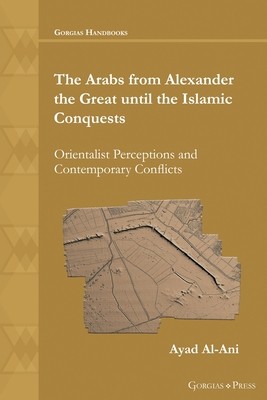
- We will send in 10–14 business days.
- Author: Ayad Al-Ani
- Publisher: Gorgias Press
- Year: 2021
- Pages: 286
- ISBN-10: 1463242859
- ISBN-13: 9781463242855
- Format: 15.2 x 22.9 x 1.5 cm, softcover
- Language: English
- SAVE -10% with code: EXTRA
The Arabs from Alexander the Great until the Islamic Conquests (e-book) (used book) | bookbook.eu
Reviews
Description
This is not a conventional history book. It is rather a study of the sociology of historical writing about a period that, although quite distant in time (330 B.C. to A.D. 670), still influences political discourse about the Arab world, and especially the relationship between the West and the Middle East. This book focuses on the riddle of the disappearance of the Arabs from history before Islam, their sudden appearance behind the banners of the Prophet, and the powerful and traumatic effect this emergence into world history has had on the relationship between the Arabs and the West. Although the mainstream Western historical narrative does not see the Arabs before Islam as a political or cultural force, or even as members of a defined cultural unit, Arab historians and more traditional Western sources do permit a rather different picture once misguiding or obscuring labels have been removed. In this study, Arabia and the Arabs appear as a region and people that enjoyed considerable linguistic, cultural, religious, and political unity centuries before Islam. The appearance of the Prophet was, from this perspective, the culmination of a historical process that had already been long underway - perhaps delayed by Roman interference in the East and the establishment of the Roman diocese of Oriens, but also reinforced by Hellenistic-Roman culture and religious thought. In this scenario, the rise of Islam is in no way surprising or in need of explanation as a retrospective forgery, as the revisionist school would have it.
EXTRA 10 % discount with code: EXTRA
The promotion ends in 19d.13:52:09
The discount code is valid when purchasing from 10 €. Discounts do not stack.
- Author: Ayad Al-Ani
- Publisher: Gorgias Press
- Year: 2021
- Pages: 286
- ISBN-10: 1463242859
- ISBN-13: 9781463242855
- Format: 15.2 x 22.9 x 1.5 cm, softcover
- Language: English English
This is not a conventional history book. It is rather a study of the sociology of historical writing about a period that, although quite distant in time (330 B.C. to A.D. 670), still influences political discourse about the Arab world, and especially the relationship between the West and the Middle East. This book focuses on the riddle of the disappearance of the Arabs from history before Islam, their sudden appearance behind the banners of the Prophet, and the powerful and traumatic effect this emergence into world history has had on the relationship between the Arabs and the West. Although the mainstream Western historical narrative does not see the Arabs before Islam as a political or cultural force, or even as members of a defined cultural unit, Arab historians and more traditional Western sources do permit a rather different picture once misguiding or obscuring labels have been removed. In this study, Arabia and the Arabs appear as a region and people that enjoyed considerable linguistic, cultural, religious, and political unity centuries before Islam. The appearance of the Prophet was, from this perspective, the culmination of a historical process that had already been long underway - perhaps delayed by Roman interference in the East and the establishment of the Roman diocese of Oriens, but also reinforced by Hellenistic-Roman culture and religious thought. In this scenario, the rise of Islam is in no way surprising or in need of explanation as a retrospective forgery, as the revisionist school would have it.


Reviews